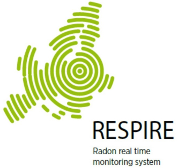IGAG-CNR
The Environmental laboratory of CNR-IGAG is divided in four main sections: 1) stable isotopes, 2) natural radioactivity, 3) environmental geochemistry and geochemical mapping, and 4) heavy isotopes. The laboratory activities are focused on geochemical characterization of soils, rocks, waters and soil gases. Customary work includes different extraction techniques on solid matrices and the study of fractionation of Sr, Nd, O, C, N and H in rocks and water, as well as stable isotope studies for geological, volcanological, biological, environmental and archaeological applications. Gas-chromatographic analyses are mainly focused on the composition of soil gases in different geological and anthropic scenarios. In the framework of the RESPIRE project, the Laboratory can provide within the natural radioactivity section the characterization of the radiogeochemical properties (i.e., U, Ra, Th and K content) of rocks, soils and waters, including the definition of isotopic ratios, dating and isotopic disequilibria. In particular, measurements of 222-radon and 220-radon and its progeny as pollutant in air, water and soil are carried out by using passive and active detectors. The Laboratory is equipped with two spectrometers HPGe with planar and coaxial configurations, as well as with portable active radon detectors equipped with the accessory for radon measurement in water, and gamma spectrometers and dosimeters to be used in the field work. CNR-IGAG has also a GIS Laboratory that provides an environment where researchers work to advance knowledge in the application of geospatial analysis and technologies to conduct scientific research mainly focused on geohazard assessment and prevention, mapping procedures, and make digital geospatial data readily available to a variety of institutional users through web-GIS facilities and other web-based distribution tools.






